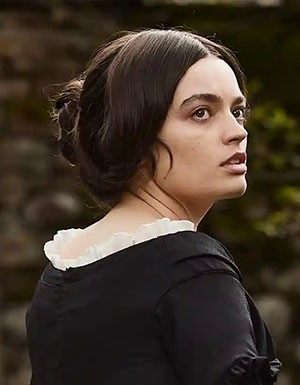Perhaps the most elusive of the Brontë sisters, Emily Brontë continues to evade us to the present day. How could the intensely shy, reclusive spinster cloistered in a small parsonage in the Yorkshire moors create one of the most intense, passionate novels in English literature?
To help keep this site running: Willow and Thatch may receive a commission when you click on any of the links on our site and make a purchase after doing so.
A romantically imagined answer comes from period drama actress Frances O’Connor (Mansfield Park, Madame Bovary, The Importance of Being Earnest) in her directorial debut.
In “Emily” (2022), haunted by the death of her mother, Emily struggles within the confines of her family life and yearns for artistic and personal freedom, and so begins a journey to channel her creative potential into one of the greatest novels of all time: Wuthering Heights.
Below, Samantha Rife reviews the feature-length film “Emily,” O’Connor’s deconstruction of Brontë.
Willow and Thatch readers will be excited to know that Rife, who owned a historical costuming retail shop in Gettysburg, is opening Fancy Some Drama, the first brick-and-mortar woman-owned storefront devoted exclusively to period drama. See the link in her bio at the end of the review to learn more about her plans for this special endeavor, and to support and follow along with the journey.
“Emily” is AVAILABLE to STREAM
As with many biopics of authors, the life of Emily Brontë, as portrayed by Emma Mackey in “Emily” (2022), largely runs parallel to the author’s penultimate classic – Wuthering Heights.
In the British period drama, Emily lives amidst all the opposing major themes of Wuthering Heights – supernatural, nature and civilization, love and passion, masculinity and femininity, class, revenge, and repetition – and they echo throughout the film with Emily showing a far greater similarity to her brooding hero of Heathcliff than her vexing heroine Catherine.
And like many preceding films about the Brontës, it is almost impossible to disassociate the family from their gloomy surrounds and the Victorian gothic.
We are first introduced to Emily Brontë as she is in the moors, lying on her back on the ground stroking a long blade of grass as she narrates a dialogue between a “Captain Sneaky” and an unnamed woman. “Captain Sneaky” lends to the imaginary worlds Emily and her siblings – Anne (Amelia Gething), Charlotte (Alexandra Dowling), and Branwell (Fionn Whitehead) – created when they were children, such as those inspired by a box of toy soldiers Branwell had received, and the fictional worlds of Angria and Gondal, found in their juvenilia.
Throughout the course of the film, scenes harken to Wuthering Heights. Following a family dinner with the new young curate, William Weightman (Oliver Jackson-Cohen), the siblings try on a theatrical mask gifted as a wedding present to Emily’s parents, Patrick Brontë and Maria Branwell and the others guess what individuals they are portraying.
When it comes to Emily’s turn, she at first refuses out of shyness, but later agrees after some prodding. The result is pure chaos as she channels her dead mother’s spirit, frightening her siblings. When the window blows open, her sisters call out to their mother’s spirit just as when Heathcliff throws open the window, summoning Catherine’s ghost, begging it to return. Emily proceeds to bury the mask, but after the emotional apex of the movie, she digs it up, channeling Heathcliff when he digs up Catherine’s dead body.
For purists, the most contentious points of the film will be Emily’s connections with the men in her life – especially her brother Branwell, and William Weightman. Both dynamics strongly evoke that of Heathcliff and Catherine. Her relationship with Branwell almost has an incestuous tinge to it, with nightly spying through windows at the home of the Lintons. These vignettes are further echoes of Wuthering Heights; Cathy and Heathcliff are brought up as brother and sister, and it is possible that Heathcliff might be the illegitimate son of Cathy’s father.
Emily’s captivation with Branwell is disrupted with the arrival of the attractive curate William Weightman, who stirs conflicting emotions within Emily. As with Heathcliff and Catherine, Emily struggles with her passionate nature that rebels against the civilizing nature of Weightman.
It isn’t long before she succumbs and they proceed to have a hidden romance. As they spend more time together, they fall in love. Weightman is drawn to her, but every time he reads her poems, he feels uneasy, and says that she might have some dark spirits inside her. This, in addition to the tumultuous events that follow, lead her to create Wuthering Heights.
Despite all its successes, many Brontë lovers will be challenged to look beyond the inaccuracy of this relationship with Weightman. William Weightman was an actual person, but there are clues that it was actually Anne who caught Weightman’s eye. Charlotte wrote that Weightman “sits opposite Anne in church sighing softly and looking out of the corners of his eyes to win her attention.” It seems the bond was reciprocal, too: it is likely that Edward Weston, the affable country parson hero of Anne’s first novel Agnes Grey (1848), was inspired by Weightman, and Anne wrote grief-stricken poetry following Weightman’s early death in 1842.
In the creative reimagining of the bond between Weightman and Emily, the period drama suggests that their affair was the casual impetus that led her to write Wuthering Heights. By inserting the fictional romance, it dilutes the idea that Emily could birth Wuthering Heights with her own genius. Time could have been better spent through the exploration of Branwell and Emily’s credo, “Freedom in Thought,” which leads to their downfall.
To its credit, the film lightly touches on themes that largely haven’t been addressed with regard to the Brontë family, such as their subconscious desires to please their father, the sometimes crippling effect the death of their mother had on the siblings, and the familial jealousy that occurred, particularly with Charlotte. In “Emily,” even Aunt Branwell makes an appearance.
Mackey does a phenomenal job of portraying an ethereal quality often attributable to intellectual genius, while remaining incredibly relatable to the viewer. The chemistry between Mackey and Oliver Jackson-Cohen is superb as Emily meets her intellectual equal in the handsome curate Weightman. It’s a great setup for the enemies-to-lovers trope and the romance pays out its dividends in deferred chemistry, palpable tension, and raw passion.
The costuming is commendable, and the fabric choices, such as the blue dress featuring a lightning bolt print that Emily wears, is accurate for the time period. Despite Emily’s proclivity for wearing her hair unbound and free while wandering the moors, we see a fair amount of period bonnets throughout the film, unlike many other period dramas today which eschew headwear.
Superb sound design immerses the viewer in the Brontë’s world. During Weightman’s initial sermon where he discusses the rain, the viewer feels drenched when the sound comes up, emphasizing Emily’s imaginative power. Sound becomes a storytelling element, in itself, throughout the film, most evidenced by the sound of the ocean utilized as basically the Emily/Weightman Love Theme.
Those looking for an accurate and authentic biography of Emily Brontë will be disappointed. Those, however, looking for a character study on the interplay between artistic creativity and individual nature, will be highly pleased by “Emily.”
“Emily” is AVAILABLE to STREAM
“Emily” (2022) is rated R for some sexuality/nudity and drug use. Watch the trailer below.
Samantha Rife is a professional historian, writer, and, since childhood, a lover of all things period drama. For over six years, Rife owned a historical costuming retail shop in Gettysburg, and long dreamed of opening Fancy Some Drama, the first brick-and-mortar woman-owned shop devoted exclusively to period drama. Follow along and support the journey here.
If you enjoyed this post, wander over to The Period Films List. You’ll especially like the Best Period Dramas: Victorian Era list. You’ll also like Ranking 5 Jane Eyre Film Adaptations.

